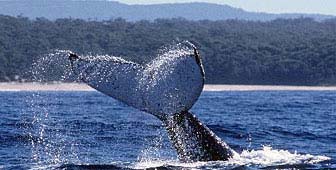Switzerland joins fight to save the whale

A five-day meeting of the international whaling commission is underway in London with discussions focusing on proposals to ease the ban on whaling. Although it is a landlocked country, Switzerland is taking part in the meeting.
Japan, Norway and Iceland are seeking the lifting of the 15-year ban on whaling, but the United States and most European Union countries want to retain it.
Thomas Althaus from the Federal Veterinary Office and Martin Krebs from the Foreign ministry are leading the Swiss delegation in London.
They are expected to voice concern about the decline in whale numbers and the threat to the mammal’s health from polluted seawater.
They have been joined by members of the Swiss working group for the protection of marine mammals (ASMS), which is dedicated to preserving the habitats and lives of dolphins, seals and mammals around the world.
ASMS is a non-governmental organisation which has been striving to conserve the marine environment for 11 years, despite the fact that Switzerland has no direct responsibility for the ocean.
Raising public awareness
ASMS works on many different levels to raise public awareness about the plight of sea mammals through media work and presentations to schools and social clubs.
Along with other organisations in the United States and England, such as the Whale and Dolphin Conservation Society, the Swiss-based group forms part of the international movement which speaks out against threats to marine mammals.
According to ASMS’s president, Sigrid Lüber, whales, which are an endangered species, still face many threats from humans.
Whales are endangered by the continued practice of whaling in countries such as Japan and Norway and they are at risk from pollutants such as DDT and dioxins which have been washed into the seawater.
Global responsibility
For Lüber, the fact that she lives in a country which has lakes instead of shorelines, does not diminish her passion to save the whale. For her it is a question of collective global responsibility.
“It is very important that I can make a contribution [to help conserve marine life] even if I come from a landlocked country, because Switzerland is contributing to the threat facing the planet,” she told swissinfo.
“Even if we are good at reducing pollutants I think that just by being here we are contributing to the pollution of the planet,” she said. ” I think every human being should be interested in conserving the living things in the ocean.”
swissinfo with agencies

In compliance with the JTI standards
More: SWI swissinfo.ch certified by the Journalism Trust Initiative
You can find an overview of ongoing debates with our journalists here . Please join us!
If you want to start a conversation about a topic raised in this article or want to report factual errors, email us at english@swissinfo.ch.